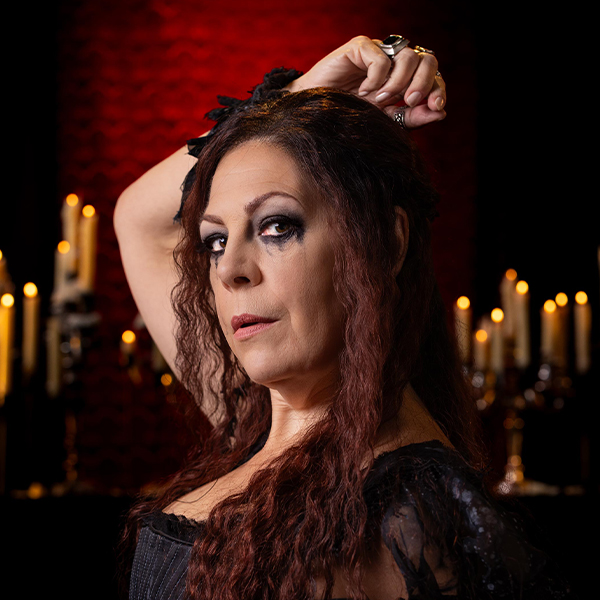September 23, 2025
Medea and Jason: operatic fire and fury
Taking on the roles of this ill-fated duo requires full dramatic commitment and utterly world-class talent.
The operatic canon abounds with character pairings who fascinate aficionado and newcomer alike: Alfredo and Violetta. Edgardo and Lucia. Lucrezia and Gennaro. Mimi and Rodolfo. Pollione and Norma. Tristan and Isolde.
Luigi Cherubini’s Medea (Médée), first performed in Paris in 1797, offers another blazing example: Medea and Jason.
At its premiere, audiences encountered a work of startling dramatic ambition: an ancient Greek tragedy recast for the Revolutionary era, with a heroine whose betrayal, fury, and vengeance burn at a white-hot pitch. At the center stand two roles that demand extraordinary voices and actors capable of matching one another in emotional intensity and psychological depth. Medea occupies a singular place in the operatic canon: a work at once steeped in 18th-century formalism and charged with proto-Romantic intensity. The drama demands that Medea and Jason embody one of antiquity’s most unsettling myths — the betrayed sorceress who turns her wrath against her unfaithful lover by murdering their children. For performers, these roles are as much emotional crucibles as they are vocal tests.
Cherubini could not have imagined that the opera would wait more than a century and a half before reentering the repertoire in earnest. It came into modern prominence in the 20th century largely through the force of Maria Callas, whose searing portrayals from Florence in 1953 onward redefined the tragic heroine. Callas’s Jason was often sung by Canadian tenor Jon Vickers, whose virile instrument and intense stage presence made him an ideal foil. Together, they created a harrowing balance: Callas embodying Medea’s volcanic emotional extremes, Vickers projecting Jason’s flawed heroism and brittle authority. Their partnership demonstrated that these roles require not only vocal stamina but also dramatic parity, since the opera hinges on the confrontation of two formidable personalities.
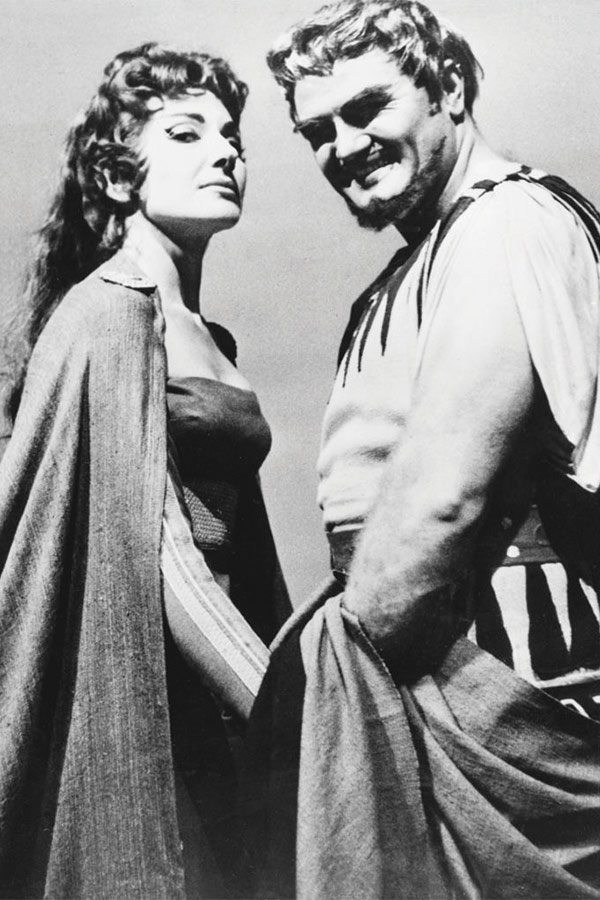
Maria Callas and Jon Vickers as Medea and Jason.
The Soprano’s Crucible: Medea
The role of Medea is among the most punishing in the soprano repertoire. It demands sheer vocal power to cut through Cherubini’s dense orchestration, flexibility to manage abrupt changes of mood, and stamina for an evening that rarely allows the heroine to leave the stage. Cherubini’s writing oscillates between long, declamatory passages — where the soprano must sustain dramatic momentum without the relief of florid melody — and moments of searing lyricism that require a bel canto sense of line.
The challenge is not only technical. Medea must embody a staggering range of emotions: the grief of betrayal, the humiliation of abandonment, the cunning of a sorceress plotting revenge, and the unimaginable horror of filicide. The singer must command the stage as a tragic actress while never letting the vocal line falter. This dual demand — vocally heroic and theatrically devastating — explains why Medea has been associated with only a handful of truly legendary sopranos.
Callas remains the touchstone. Beginning with her 1953 Florence performances under Vittorio Gui, Callas fused her incisive declamation and penetrating timbre with an unparalleled dramatic instinct. She transformed Medea from an antiquarian curiosity into a modern psychological drama, capable of electrifying post-war audiences. For Callas, the role became a signature, and her portrayals with conductors such as Leonard Bernstein and colleagues such as Jon Vickers demonstrated the role’s potential to devastate and enthrall in equal measure.
But Callas was not alone. Magda Olivero, famed for her longevity and incandescent theatricality, brought Medea an Italianate warmth that made the character’s anguish almost unbearable in its humanity. Montserrat Caballé, with her seamless legato and gleaming top, reimagined Medea less as a raw tragedienne than as a noble figure undone by betrayal, her purity of tone making her final acts of vengeance all the more chilling. Later interpreters such as Anna Caterina Antonacci and Jennifer Larmore have stressed the role’s dramatic immediacy, balancing declamation with vocal clarity, each finding ways to harness Cherubini’s difficult tessitura for modern audiences.
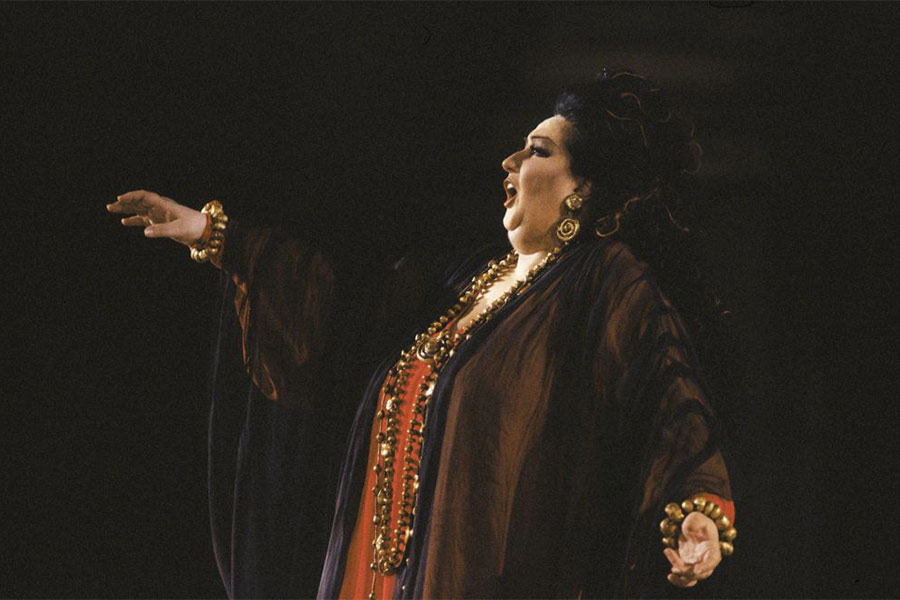
Montserrat Caballé as Medea at the Roman Theatre of Merida in 1989.
Jason: A Tenor’s Test of Authority
If Medea is the opera’s flaming center, Jason can never be merely her shadow. His role, though often underestimated, requires both noble phrasing and heroic projection, along with the ability to reveal weakness and duplicity. The tessitura lies high, demanding brilliance at the top and weight in the middle voice. Dramatically, Jason is no cardboard villain but a flawed hero whose betrayal precipitates catastrophe.
Historically, Jason has been most successful when embodied by a tenor of commanding presence. Jon Vickers, opposite Callas, offered a Jason of granite — vocally stentorian, dramatically unyielding. His very severity amplified the inevitability of Medea’s revenge. Mario del Monaco, in Italian productions, brought raw power and a heroic timbre that matched sopranos like Olivero in sheer vocal amplitude. Giuseppe Giacomini, a frequent partner to Caballé, found dignity and lyricism in Jason’s lines, offering a balance between grandeur and pathos. More recently, Roberto Alagna has offered Jason as a man seduced by political advantage, his elegant French style tempering the character’s brutality.
Jason, then, is not a passive counterpart. The tenor who sings the role must provide a genuine obstacle to Medea’s domination of the stage. Only when Jason is sung with equal conviction does Cherubini’s tragedy become a true confrontation of wills, rather than a soprano star vehicle.
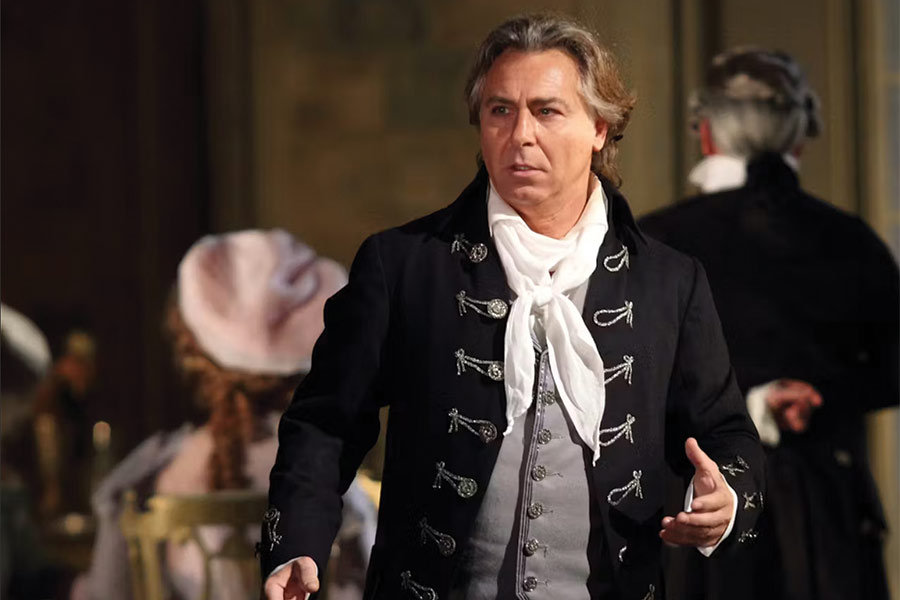
Roberto Alagna brought an elegance to the role of Jason at London's Royal Opera House.
The Alchemy of Partnership
Cherubini’s opera rises or falls on the chemistry between its soprano and tenor. Medea is not merely the story of a woman’s descent into vengeance; it is the story of a couple’s collapse, played out with shattering consequences. The most memorable productions have been those in which Medea and Jason are evenly matched — two singers capable of igniting sparks in every confrontation.
The Callas–Vickers partnership is often remembered as definitive because it captured this volatile balance: Callas’s sorcery set against Vickers’s uncompromising strength. Olivero and del Monaco embodied verismo intensity, their voices clashing with visceral impact. Caballé and Giacomini, by contrast, found nobility and grandeur, shaping the opera into a more dignified, almost classical tragedy. Each partnership reveals how the opera can be tilted toward psychological realism, verismo fire, or neoclassical restraint.
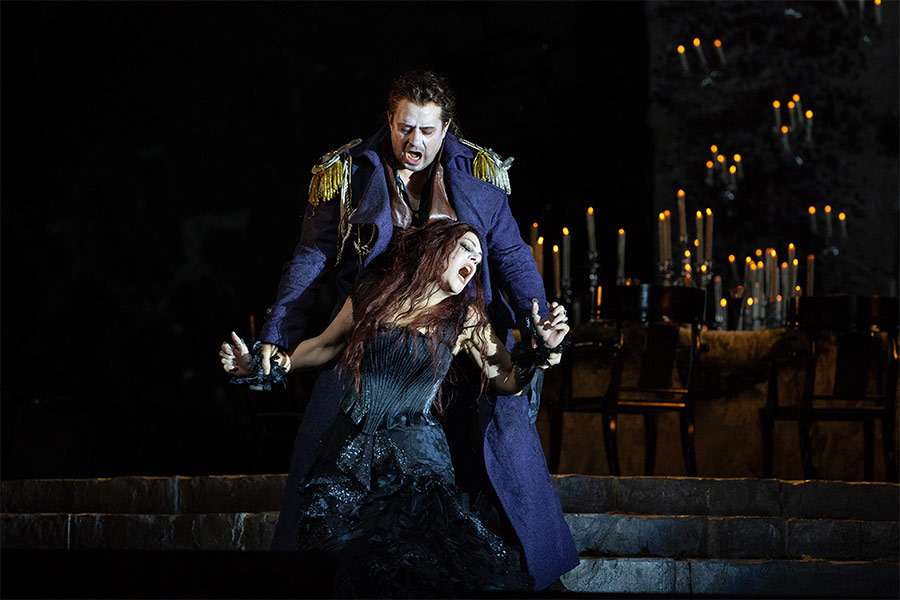
Sondra Radvanovsky and Matthew Polenzani as Medea and Jason at the Metropolitan Opera.
Now Playing — at Lyric
Into this storied lineage step Sondra Radvanovsky and Matthew Polenzani.
Radvanovsky has long been celebrated for her expansive Verdi portrayals and for her command of roles that demand both vocal brilliance and emotional depth. Her voice combines radiant upper registers with a strong dramatic core, enabling her to sustain Cherubini’s declamation without strain while still offering moments of ravishing lyricism. She brings to Medea not only technical stamina but also a rare ability to inhabit a character’s psyche, to reveal both the wounded humanity and the terrifying extremity of a woman driven to unimaginable revenge.
Polenzani, one of the most admired American tenors of his generation, has built his reputation on elegance, clarity, and dramatic sincerity in repertory from Mozart to French grand opera. In recent years he has expanded into roles of greater heft, his timbre acquiring a heroic ring that never loses its lyric beauty. As Jason, he brings both dignity and vulnerability, making the character more than a foil for Medea’s rage. His Jason is capable of grandeur, but also of the moral weakness that makes Cherubini’s tragedy so devastating.
Together, Radvanovsky and Polenzani promise a partnership that will balance fire and nobility, rage and lyricism. Their collaboration situates Lyric’s Medea firmly within the historical continuum of great soprano–tenor pairings, while offering something uniquely their own: two American singers, each at the height of an international career, uniting to take on one of opera’s most formidable challenges.
The Tragic Confrontation
Medea endures as one of opera’s most unflinching examinations of betrayal and revenge. At its core is not only the story of an abandoned woman, but the story of a partnership destroyed, a bond corrupted by ambition and faithlessness. Cherubini’s score leaves no room for compromise: the soprano must embody the searing extremes of Medea’s character, the tenor must hold his ground as Jason, and together they must ignite the fatal spark.
From Callas and Vickers to Radvanovsky and Polenzani, singers who undertake these roles enter a lineage of artistic courage. They place themselves in a crucible where vocal technique, dramatic instinct, and emotional truth are tested at the highest level. For audiences at Lyric Opera of Chicago, the result will be an encounter not only with Cherubini’s ravishing music, but with the timeless human drama it conveys: the perilous collision of love, betrayal, and vengeance between two voices locked in an operatic wildfire.
Dr. Justin Vickers is Distinguished Professor of Music at Illinois State University. As editor of the forthcoming Childhood and the Operatic Imaginary since 1900 (Oxford University Press, 2026), Vickers writes about Benjamin Britten’s children’s operas.
Selected Discography
For those interested in a deeper dive, here’s a selection of memorable Medea recordings from the past 75 years.
First modern revival, electrifying Callas debut:
Maria Callas, Medea
Mirto Picchi, Giasone
Vittorio Gui, conductor
Warner Classics / EMI, 1953
Florence, Maggio Musicale (Live, Italian)
The iconic pairing, filled with high-voltage confrontations:
Maria Callas, Medea
Jon Vickers, Giasone
Tullio Serafin, conductor
Warner Classics / EMI, 1957
La Scala, Milan (Live, Italian)
Electrifying American debut of Medea with Callas:
Maria Callas, Medea
Jon Vickers, Giasone
Nicola Rescigno, conductor
Warner Classics, 1958
Dallas, USA (Live, Italian)
Callas in a slightly weathered, powerful performance:
Maria Callas, Medea
Jon Vickers, Giasone
Tullio Serafin, conductor
Opera d’Oro / various, 1961
La Scala, Milan (Live, Italian)
Olivero’s searing theatricality, less often recorded but revered:
Magda Olivero, Medea
Bruno Prevedi, Giasone
Oliviero de Fabritiis, conductor
Various labels, 1969
Naples (Live, Italian)
Caballé’s regal, bel canto-inflected performance:
Montserrat Caballé, Medea
Giuseppe Giacomini, Giasone
Jesús López-Cobos, conductor
Opera Rara / various, 1973
La Scala, Milan (Live, Italian)
A dramatic mezzo timbre with a darker hue:
Grace Bumbry, Medea
Peter Dvorsky, Giasone
Lamberto Gardelli, conductor
Orfeo / House of Opera, 1986
London, Covent Garden (Live, Italian)
One of the first serious assays of the French version:
Anna Caterina Antonacci, Medea
Rockwell Black, Jason
Gustav Kuhn, conductor
Nuova Era, 1993
Florence, Maggio Musicale (Live, French, critical edition)
Dramatically raw and modern staging; restored French text:
Anna Caterina Antonacci, Medea
Roberto Alagna, Giasone
Evelino Pidò, conductor
Naïve DVD, 2008
Théâtre du Châtelet, Paris (Live, French)
Recent revival with powerful orchestral detail:
Christiane Libor, Medea
Jorge de León, Giasone
Bertrand de Billy, conductor
House label / streaming, 2015
Vienna State Opera (Live, Italian)

